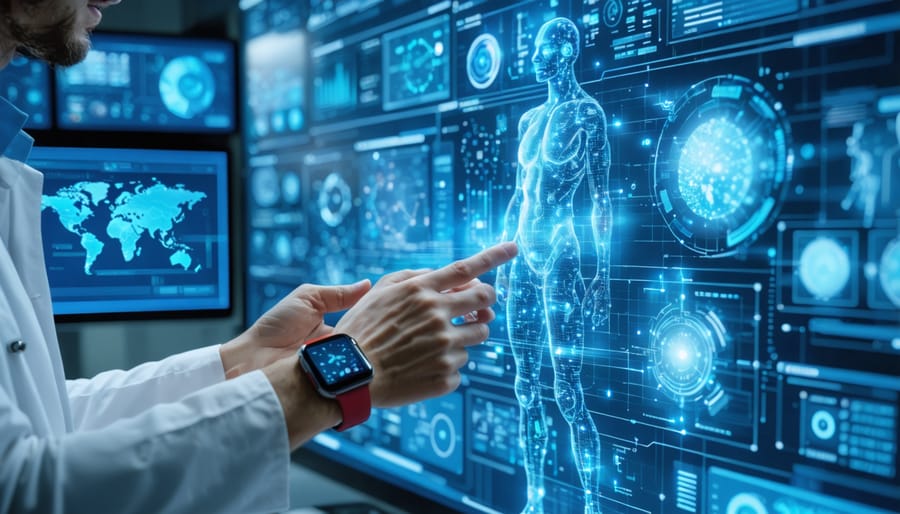Artificial intelligence is revolutionizing healthcare delivery, transforming how we predict, prevent, and treat diseases with unprecedented accuracy and efficiency. From early disease detection to personalized treatment plans, AI-powered systems are analyzing vast amounts of medical data in seconds, spotting patterns that human physicians might miss, and enabling proactive interventions before conditions become critical.
Today’s healthcare facilities are implementing AI solutions that can predict patient risks, optimize treatment protocols, and streamline administrative tasks with remarkable precision. Machine learning algorithms now scan medical images to detect cancers at early stages, while natural language processing helps doctors quickly access relevant patient information from complex medical records. These innovations aren’t just improving treatment outcomes – they’re fundamentally changing the doctor-patient relationship by enabling more informed, data-driven decisions.
What makes this technological revolution particularly exciting is its potential to democratize high-quality healthcare. AI-powered diagnostic tools are making expert-level medical analysis accessible to remote and underserved communities, while predictive analytics help healthcare providers allocate resources more effectively, reducing costs and improving care quality for everyone.
This transformative integration of AI into healthcare represents one of the most promising developments in modern medicine, offering hope for more precise, personalized, and accessible medical care for millions worldwide.
How AI Transforms Disease Prevention
Machine Learning in Health Risk Prediction
Machine learning algorithms are revolutionizing health risk prediction by analyzing vast amounts of patient data to identify potential health issues before they become serious. These systems examine multiple data points, including electronic health records, genetic information, lifestyle factors, and even data from wearable devices, to create comprehensive risk profiles for individual patients.
For example, ML models can predict a patient’s likelihood of developing cardiovascular disease by analyzing patterns in blood pressure readings, cholesterol levels, family history, and daily activity data. These predictions are continuously refined as new data becomes available, making them increasingly accurate over time.
Healthcare providers are using these predictive models to implement personalized preventive care strategies. When an algorithm flags a patient as high-risk for a particular condition, doctors can recommend specific screenings, lifestyle changes, or preventive treatments. This proactive approach is particularly effective in managing chronic conditions like diabetes, where early intervention can significantly improve outcomes.
The technology has shown promising results in identifying early signs of various conditions, from cancer to mental health disorders, enabling healthcare providers to intervene at the most opportune time for treatment success.

Real-time Health Monitoring Systems
Modern healthcare is witnessing a revolution through AI-powered wearables and monitoring devices that provide continuous health tracking. These smart devices, ranging from smartwatches to biosensors, collect real-time data about vital signs, physical activity, and overall well-being. For instance, advanced fitness trackers can now detect irregular heart rhythms and alert users to potential cardiac issues before they become serious.
One significant advancement is AI-powered sleep monitoring, which analyzes sleep patterns and quality, helping identify potential sleep disorders and their impact on overall health. These systems use machine learning algorithms to process data from multiple sensors, providing insights that were previously only available in sleep clinics.
The integration of these monitoring systems with healthcare providers’ networks allows for immediate response to emergencies and better-informed treatment decisions. When unusual patterns are detected, the system can automatically notify healthcare providers or emergency services, potentially saving lives through early intervention.
These devices are particularly valuable for managing chronic conditions, allowing patients and healthcare providers to track symptoms, medication adherence, and treatment effectiveness in real-time, leading to more personalized and proactive care approaches.
Personal Health Risk Assessment
Genetic Analysis and AI
The intersection of artificial intelligence and genetic analysis has revolutionized how we understand and predict health risks. Modern AI systems can process vast amounts of genetic data in minutes, identifying patterns and correlations that would take human researchers years to discover.
These AI tools analyze genetic markers, family health histories, and environmental factors to create detailed risk assessments for various conditions, from cancer predisposition to cardiovascular diseases. For example, machine learning algorithms can scan through millions of genetic variations to identify specific mutations associated with breast cancer, enabling earlier interventions for high-risk patients.
The process typically begins with DNA sequencing, where AI assists in reading and interpreting the genetic code. Advanced neural networks then compare this information against extensive databases of known genetic variants and their associated health outcomes. This analysis helps healthcare providers develop personalized prevention strategies and treatment plans tailored to each patient’s genetic profile.
What makes this technology particularly powerful is its ability to learn and improve over time. As more genetic data becomes available, AI systems continuously refine their predictive models, leading to increasingly accurate risk assessments. This dynamic learning process helps identify previously unknown genetic markers and their relationships to various health conditions.
For patients, this means more precise and personalized healthcare decisions based on their unique genetic makeup, moving beyond one-size-fits-all approaches to truly individualized medicine.

Lifestyle and Environmental Factor Analysis
AI-powered healthcare systems are revolutionizing how we understand the impact of lifestyle choices and environmental factors on our health. These intelligent systems analyze vast amounts of data from wearable devices, smart home sensors, and environmental monitoring stations to create a comprehensive picture of an individual’s daily habits and surroundings.
Through continuous monitoring, AI algorithms can identify patterns between lifestyle choices – such as diet, exercise, and sleep habits – and their effects on health outcomes. This enables more effective personalized wellness planning tailored to each individual’s unique circumstances.
The technology also considers environmental factors like air quality, temperature fluctuations, and seasonal changes, correlating them with health metrics to predict potential risks. For instance, AI systems can alert asthma patients about poor air quality days or warn individuals with seasonal allergies about high pollen counts before symptoms appear.
What makes these systems particularly powerful is their ability to learn and adapt over time. As they gather more data about an individual’s responses to different environmental conditions and lifestyle changes, their recommendations become increasingly accurate and personalized. This dynamic approach helps healthcare providers make more informed decisions about preventive care strategies and allows individuals to make smarter choices about their daily habits.
Early Warning Systems
Predictive Analytics in Healthcare
Predictive analytics in healthcare leverages AI algorithms to analyze vast amounts of patient data, identifying potential health risks before they become serious issues. By examining patterns in medical records, genetic information, lifestyle data, and even wearable device readings, AI systems can forecast health outcomes with remarkable accuracy.
These systems are particularly effective in chronic disease management, where early intervention can significantly improve patient outcomes. For instance, AI models can predict the likelihood of heart disease by analyzing blood pressure trends, cholesterol levels, and lifestyle factors, enabling healthcare providers to implement preventive measures proactively.
Machine learning algorithms also excel at identifying subtle patterns that might escape human observation. They can detect early signs of conditions like diabetes, cancer, or mental health issues by analyzing combinations of symptoms, lab results, and patient history. This capability allows healthcare providers to initiate treatment earlier, potentially saving lives and reducing healthcare costs.
Healthcare organizations are increasingly using these predictive tools to manage population health, allocate resources more efficiently, and create personalized prevention strategies for patients. As these systems continue to learn from new data, their predictive accuracy keeps improving, making them invaluable assets in modern healthcare delivery.

Population Health Management
AI is revolutionizing population health management by analyzing vast amounts of health data to identify trends, predict outbreaks, and manage public health resources more effectively. These smart systems process information from multiple sources, including electronic health records, wearable devices, and demographic data, to create comprehensive health profiles for entire communities.
Machine learning algorithms can detect patterns that might escape human observation, helping healthcare providers anticipate and prevent disease outbreaks. For example, AI systems can track seasonal illness patterns, monitor vaccination rates, and identify high-risk populations for targeted interventions. This includes mental health monitoring across communities to identify areas needing additional support services.
By analyzing social determinants of health alongside clinical data, AI helps healthcare organizations develop more effective preventive care strategies. The technology can predict which populations are most likely to develop specific conditions, enabling proactive interventions before health issues become severe.
These systems also support resource allocation by identifying areas where healthcare services are most needed. This data-driven approach helps healthcare providers and policymakers make informed decisions about where to establish new facilities, deploy medical staff, or implement targeted health programs, ultimately improving community health outcomes while reducing costs.
Implementation Challenges and Solutions
Despite the promising potential of AI in healthcare, several significant challenges need to be addressed for widespread adoption. Data privacy and security remain primary concerns, as healthcare organizations must protect sensitive patient information while maintaining compliance with regulations like HIPAA. The integration of AI systems with existing healthcare infrastructure often proves complicated, as many hospitals still rely on legacy systems that weren’t designed for AI implementation.
Another major hurdle is the resistance from healthcare professionals who may feel threatened by AI or skeptical about its reliability. This is compounded by the “black box” nature of some AI algorithms, where the decision-making process isn’t always transparent or easily explainable to medical staff and patients.
However, solutions are emerging to address these challenges. Healthcare organizations are implementing robust data encryption and anonymization techniques to ensure patient privacy. Modern healthcare platforms are being designed with AI compatibility in mind, making integration smoother. To address the transparency issue, developers are focusing on creating explainable AI models that can provide clear reasoning for their recommendations.
Training programs for healthcare professionals are being developed to demonstrate how AI can augment rather than replace human expertise. These programs emphasize AI as a supportive tool that can help reduce administrative burden and improve diagnostic accuracy, allowing medical professionals to focus more on patient care.
Additionally, regulatory frameworks are evolving to accommodate AI in healthcare while ensuring patient safety. Organizations like the FDA are developing guidelines specifically for AI-powered medical devices and applications, providing a clearer path for innovation while maintaining high safety standards.
Future Perspectives
The future of AI-powered healthcare holds transformative potential that could revolutionize how we prevent, diagnose, and treat diseases. As we look ahead, several groundbreaking developments are on the horizon. Quantum computing integration with AI systems promises to accelerate drug discovery processes from years to months, potentially leading to more personalized and effective treatments. Advanced neural networks are expected to achieve human-level accuracy in diagnostic imaging by 2025, while some experts predict they may even surpass human capabilities in certain specialized areas.
Wearable technology is evolving to incorporate more sophisticated AI algorithms, enabling continuous health monitoring and real-time risk assessment. These devices will likely evolve beyond simple fitness tracking to detect early signs of various conditions, from heart problems to neurological disorders, before symptoms become apparent.
The integration of AI with genomics and precision medicine is another promising frontier. Machine learning algorithms will better understand individual genetic variations, leading to highly personalized treatment plans and drug recommendations with fewer side effects. This could particularly impact cancer treatment, where AI might predict tumor behavior and suggest optimal therapy combinations.
Robotics in healthcare is also set to advance significantly. AI-powered surgical robots will become more autonomous, performing complex procedures with greater precision while reducing recovery times. Virtual nursing assistants, powered by advanced natural language processing, will provide 24/7 patient monitoring and support, helping address healthcare worker shortages.
Perhaps most exciting is the potential for AI to democratize healthcare access. Telemedicine platforms enhanced with AI will bring specialized medical expertise to remote areas, while automated diagnostic tools will help bridge the healthcare gap in underserved communities. These developments could significantly reduce healthcare disparities globally.
However, this future also brings important considerations around data privacy, algorithmic bias, and the need for human oversight. As these technologies mature, maintaining a balance between innovation and ethical implementation will be crucial for ensuring AI truly serves the best interests of patients and healthcare providers alike.
The integration of AI in preventive healthcare represents a significant leap forward in how we approach health management and disease prevention. By analyzing vast amounts of patient data, AI systems are revolutionizing our ability to identify health risks before they develop into serious conditions. This proactive approach not only saves lives but also reduces the overall burden on healthcare systems worldwide.
The impact of AI on preventive care is particularly evident in early disease detection, where machine learning algorithms can spot subtle patterns that might escape human observation. From identifying potential cardiovascular issues through routine checkup data to detecting early signs of cancer in medical imaging, AI has demonstrated remarkable accuracy and efficiency in risk assessment.
Looking ahead, the future of AI in preventive healthcare appears even more promising. Emerging technologies like federated learning are enabling healthcare providers to collaborate while maintaining patient privacy, and advances in natural language processing are making health monitoring more accessible through conversational interfaces and virtual health assistants.
However, the true potential of AI in healthcare will only be realized through continued collaboration between healthcare professionals, technologists, and policymakers. As these technologies become more sophisticated and widely adopted, we can expect to see more personalized preventive care strategies, improved health outcomes, and more efficient healthcare delivery systems that benefit both patients and providers.
The journey toward AI-powered preventive healthcare is just beginning, but the foundations being laid today promise a future where proactive health management becomes the norm rather than the exception.

